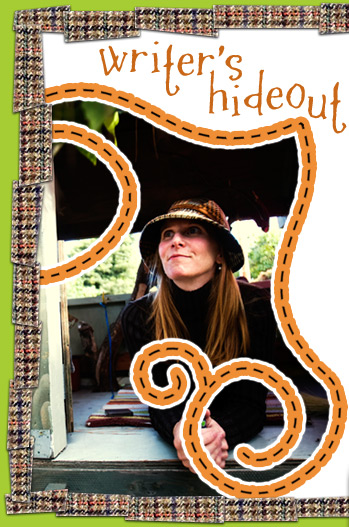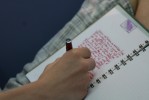
A Writer on the Road
Monday, July 7, 2008
Having just returned from a month-long excursion abroad, I'm full of thoughts about what specific experiences worked for me while on the road, and what I could have done better. I've written several books after traveling, some trips planned specifically for research and other writing projects springing spontaneously from time away from home. Even though I've traveled quite a lot over the years, there are always new lessons to learn—here are some that have to do with being a writer on the road...
- 1. Experience. Instead of visiting a city and all its sites, I always try to get into the local flow, and experience life first hand. It's tough to incorporate bits on the Swiss Alps into a book if you only see them from the window of a car. While passing a mountain pasture, get out of the car, sit on a wall, breathe the air. Better yet, make inquiries before you leave, trying to find local people to meet—or be gregarious and sit in the village square or café and make friends. The best story stuff comes from walking in the shoes of a local. This last trip our family helped in the annual making of mountain hay. We spent two days cutting fields, turning the grasses, bailing hay and stacking it. We got to feel the wooden rakes in our hands, the sun on our back. We smelled the flowers mixed in with the grasses and saw the variety of plants that those lucky cows get to eat. In between work we ate with the families: fontina; polenta; sausages; wine... all of it homemade, with the smells and tastes and chatter that accompanies food. You can bet I'll find a way to get these folks and their mountain slopes into a book...
- 2. Become an Extrovert. To find out what life is really like outside of your home town it helps to be curious. Being more prone to hide away and write than to chatter with folks on the front step, I have to work extra hard while I'm away when it comes to talking. But the extra effort always pays off. Finding out the details for your stories is essential. Why are the grasses cut in the morning? How many cows does this field feed? What time of year is the fontina made? May I see the cellar where you make it? May I swing the scythe? Do you have any band-aids for this blister?! It's fine to do research from a book, or by interviewing others, but books and interviews don't give you blisters...
- 3. Journaling. This is a top priority while away. I always buy a brand new journal with lots of pages and keep copious notes. I've found that you simply can not write too much. Even though I format my journal day by day, recounting events, I do my best to write about as many small details as possible. Here's a bit from our time in the Italian Alps. When I walked into the pub in Valpelline, I smelled port and noticed that the group of 12 or so men were drinking from small stemmed, elegant glasses. Their gruff mountain hands contrasted so sharply with those small glasses. Outside it drizzled; though it was June, winter was still pestering the mountains and people griped about it non-stop, in every conversation. When we left more than two hours later, those same men had finished their drinks and had started lively games of cards taking up several tables. It now smelled of men, not port—of sweat and strong breath; and though I'm a typical American who doesn't like bodily odors, somehow the smells all fit the scene and felt comforting...
- 4. Photography. Just like journaling helps me to reenter a place when I want to write about it—so do pictures. But note this—it's the unlikely photos that usually help the most. Vast panoramas may help to give an overall view of the place—or of a specific scene you want to capture, but it's the photos of woodpiles, of the woman and her stash of bee houses in the corner of her yard, that help the most when writing. These aren't photos that you tend to share with family when you return, but they help when trying to recreate a scene in words. Photography is dangerous, however; you have to be careful not to become too attached to the camera, hence becoming the eternal onlooker. That lens gets in the way from experiencing the real thing, so solicit help from those you're traveling with, if possible.
- 5. Buy a New Pen! Ha! I don't think I'm alone here. Being a writer brings with it the sometimes absurd love of pens and paper. Though I can hardly afford to purchase some of the pens that I slobber over in specialty shops I do try to look for inexpensive but unusual pens, ink, or paper that I can play with. I believe having as much fun as I can with my craft helps me to be a better writer. So if that new orange fountain pen might help my brain turn some particularly lovely phrases, then it's worth the investment! This trip I found a new, inexpensive brand in Rome: Campo Marzio, and I purchased five pens: three as gifts; one for myself; and one reserve for something or someone yet undetermined.
- 6. Get Writing. I find it's good to mull over my experiences and process them before I really allow them to become a part of a story, but I try to get back to the craft of writing as soon as possible. Even if I'm simply continuing my journal entries—adding bits of certain experiences that were left out but still fresh in my mind. In fact, I think writing every day, despite my creative impulses, is important in order to remain a fruitful and long-term writer. I don't always abide by my own advice and I see the difference it makes when it's time to conjure the muse. So please excuse me, time's up, gotta get back to that story!
Comments (2)










